Blog del Instituto Cervantes de Dublín
Torre Martello
Proyección de cine | Film Screening: Los dioses rotos
No olvides tu cita con el mejor cine cubano hoy a las 18:00 horas en el Café 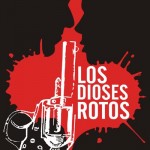 Literario. La película de hoy es Los dioses rotos.
Literario. La película de hoy es Los dioses rotos.
Laura (35 años) es una profesora universitaria que prepara su tesis de maestría sobre el famoso proxeneta cubano Alberto Yarini y Ponce de León,asesinado a balazos por sus rivales franceses que controlaban el negocio de la prostitución en La Habana de comienzos del siglo XX. Alberto y Sandra (24 años) nos hablan de una juventud signada por su entorno social. Ella, saliendo de la cárcel; él, de regreso de París en el albor de su carrera como gigoló.
Pero más allá de su anécdota, Los Dioses Rotos es una trama de valores enfrentados; una reflexión en torno a la perspectiva ética y moral de un grupo de personajes -de todos los niveles socioculturales- entre quienes los clichés de “positivos” y “negativos” no resultan sencillos de etiquetar. Drama social, suspense y melodrama comulgan en una historia interesada en resultar amena, universal y consecuente con la realidad a la que se debe.
Don´t forget your appointment with the best Cuban cinema today at 6pm at Café Literario. The movie for today is Los dioses rotos.
Laura (35 years) is a University professor preparing her master’s thesis on
the famous Cuban pimp Alberto Yarini y Ponce de León, gunned down by his French rivals, who controlled the prostitution business in Havana at the start of the 20th century. Alberto and Sandra (24 years) tell us of a youth marked by their
social environment. She, just out of jail; he, just back from Paris and starting
his career as a gigolo.
But beyond its anecdote, The Fallen Gods is a story of values confrontation; a reflexion around the ethical and moral perspective of a group of characters –from all social and cultural backgrounds- among who the “positive” and “negative” clichés are not easy to label. Social drama, suspense and melodrama together in a story aiming at being interesting, universal and consequent with its reality.
Proyección de cine | Film Screening: El Benny
Ayer inauguramos la exposición de carteles de cine cubano y esta tarde comenzamos un ciclo de cine con lo mejor del cine contemporáneo de Cuba. La proyección de hoy es El Benny. Te esperamos a las 18:00 en el Café Literario.
Recién llegado de México donde consolidó su carrera a finales de los años cuarenta, Benny Moré es el artista que a través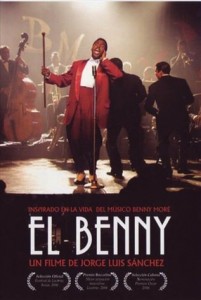 de la música y del baile hace delirar a las multitudes. El desgaste de la traición le hace fracasar en su empeño de armar la añorada banda de jazz. Frustrado y bajo los excesos de alcohol y sexo, su vida se caotiza. Con no poco esfuerzo vuelve a armar su banda y triunfa. Una venganza de viejos tiempos lo envuelve en un conflicto policial en Venezuela del que sale absuelto. Famoso y con dinero los desenfrenos de otros tiempos derivan en una severa crisis hepática que lo pone al borde de la muerte, prohibiéndole el médico definitivamente el alcohol. Contra todo pronóstico se recupera y reaparece en los principales cabarets y salones de Cuba. Una noche, en medio de un bailable, confiado por la aparente buena salud, viola la prohibición y se le acaba la vida como lo había soñado: cae sobre el escenario, delante de su público, que pasa del delirio a la consternación.
de la música y del baile hace delirar a las multitudes. El desgaste de la traición le hace fracasar en su empeño de armar la añorada banda de jazz. Frustrado y bajo los excesos de alcohol y sexo, su vida se caotiza. Con no poco esfuerzo vuelve a armar su banda y triunfa. Una venganza de viejos tiempos lo envuelve en un conflicto policial en Venezuela del que sale absuelto. Famoso y con dinero los desenfrenos de otros tiempos derivan en una severa crisis hepática que lo pone al borde de la muerte, prohibiéndole el médico definitivamente el alcohol. Contra todo pronóstico se recupera y reaparece en los principales cabarets y salones de Cuba. Una noche, en medio de un bailable, confiado por la aparente buena salud, viola la prohibición y se le acaba la vida como lo había soñado: cae sobre el escenario, delante de su público, que pasa del delirio a la consternación.
La proyección de esta película estará precedida de un cóctel inaugural cortesía de la Embajada de Cuba.
Yesterday we celebrated the opening of the Exhibition of Cuban Film Posters and this evening we start a film series with the very best of Cuban Contemporary Cinema. The screening for today is El Benny. We hope to see you today at 6pm at Café Literario.
Just back from Mexico, where he consolidated his career in the 40s, Benny Moré through music and dance turns the public delirious. Betrayed by some friends, fails to put together the jazz band of his dreams. Frustrated and under the effects of alcohol and sex, his life turns into chaos. He finally forms the band again and succeeds. Due to an old revenge he gets embroiled in a police conflict in Venezuela and is acquitted. Now famous and with money, the excesses of previous times provoked a serious hepatic crisis that nearly killed him. Doctors tell him he cannot drink alcohol ever again. Against all odds, he recovers and comes back into the main Cuban cabarets and saloons. One night, while performing, confident of his recovery, he breaks doctors’ orders against alcohol and ends his life the way had dreamed: he falls on the stage, in front of his public, which passed from delirium to consternation.
Exposición: Carteles de cine cubanos | Exhibition: Cuban Film Posters
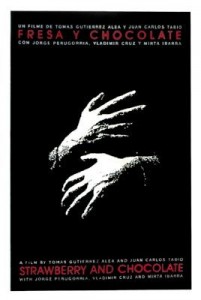 Empezamos nuestra programación cultural de año con un plato fuerte: una fantástica exposición de carteles de cine cubano que podrás disfrutar en nuestra Sala de Exposiciones del 16 al 31 de enero. El horario de visita de la exposición es de lunes a jueves de 14:00 a 19:00 y los sábados de 10:00 a 14:00.
Empezamos nuestra programación cultural de año con un plato fuerte: una fantástica exposición de carteles de cine cubano que podrás disfrutar en nuestra Sala de Exposiciones del 16 al 31 de enero. El horario de visita de la exposición es de lunes a jueves de 14:00 a 19:00 y los sábados de 10:00 a 14:00.
El Instituto Cubano de Arte e Industria Cinematográficos (ICAIC), el instituto del cine cubano, fue fundado en 1959; su objetivo es promover el medio del cine a través de una amplia gama de actividades, incluida la producción de cine y televisión. El ICAIC también presenta cada año a través de toda Cuba numerosas proyecciones de películas de producción local e internacional. Y para cada una de ellas se crea un cartel único, diseñado por un artista gráfico cubano.
El ICAIC imprime la mayoría de sus carteles de cine diseñados originalmente, como serigrafías en formato de 20×30 pulgadas. Estos carteles se distribuyen por toda Cuba y destacan el importante papel que el cine y las artes visuales desempeñan en la actualidad cubana.
Los carteles se hacen totalmente a mano. En el proceso de serigrafía, se corta un plano individual para cada color. Cada color se aplica individualmente y toma 24 horas en secarse antes de que se pueda aplicar el siguiente color.
Esta es una exhibición única, que se presenta al público irlandés coincidiendo con la Muestra de Cine Cubano, como parte de las celebraciones del Día Nacional de Cuba, del 16 al 31 de enero de 2013.
Our cultural activity for the new year is starting this week with the opening of a great exhibition of Cuban Film Posters. You will be able to enjoy it in our Exhibition Room from 16-31 January. These are the opening hours: Mon-Thur 2-7pm, Sat 10am-2pm.
The Instituto Cubano de Arte e Industria Cinematográficos (ICAIC), the Cuban film institute, was established in 1959; it aims to promote the medium of film through a range of diverse activities including film and television production. ICAIC also presents numerous screenings of locally produced and international films throughout Cuba each year. And for each, a unique poster is created by a Cuban graphic artist.
ICAIC prints the majority of its originally designed film posters as silk-screens in a 20×30 inch format. These posters are widely distributed across Cuba, and highlight the important role that cinema and the visual arts play in contemporary Cuban life.
These posters are totally handmade. In the silk-screen process a screen is hand cut for each individual colour. Each colour is applied separately. Each colour takes 24 hrs to dry before the next can be applied. This is a unique exhibition presented to the Irish public coinciding with the Cuban Film Season, as part of the celebrations of the National Day of Cuba, from 16-31 January 2013.
Cine | Film screening: Volver a empezar
Despedimos el ciclo de cine dedicado al director José Luis Garci con uno de los éxitos históricos del cine español: Volver a empezar. Para disfrutar de esta película en pantalla grande, pasa por nuestro Café Literario hoy a las 18:00.
Antonio Albajara (Antonio Ferrandis) es un exitoso poeta y profesor de la Universidad de Berkeley y reciente ganador de un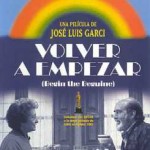 premio Nobel que vuelve a Gijón, su tierra natal. Vuelve buscando todo aquello que dejó en su juventud; allí se reencontrará con su pasado: su viejo amigo Roxiu (ambos jugaron en el equipo de fútbol del Sporting de Gijón años atrás) y su viejo amor, Elena (Encarna Paso). Con sus recuerdos, sus amigos y Elena, Antonio comenzará un viaje inolvidable para todos.
premio Nobel que vuelve a Gijón, su tierra natal. Vuelve buscando todo aquello que dejó en su juventud; allí se reencontrará con su pasado: su viejo amigo Roxiu (ambos jugaron en el equipo de fútbol del Sporting de Gijón años atrás) y su viejo amor, Elena (Encarna Paso). Con sus recuerdos, sus amigos y Elena, Antonio comenzará un viaje inolvidable para todos.
Ganadora del premio Oscar en la categoría de“Mejor película de habla no inglesa” en 1982.
Today is the last session of the José Luis Garci film series and we´ll show one of the biggest success of Spanish cinema: Volver a empezar. If you wish to enjoy this film on big screen, come to our Café Literario today at 6pm.
Antonio Albajara (Antonio Ferrandis), a successful poet and lecturer at Berkley University, recent Nobel Prize winner, comes back to his hometown Gijón in the north of Spain. He looks for what he had left behind in his youth and he is reunited with his old friend Roxiu (they used to play together in Gijón’s football team many years ago) and his first great love Elena (Encarna Paso). With his memories, his friends and Elena, he will set off for a journey which will prove unforgettable to all.
The film won the 1982 Academy Award for Best Foreign Language Film.
Cine | Film Screening: El abuelo
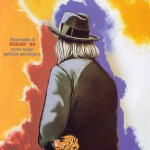 Continuamos con el ciclo de cine dedicado José Luis Garci con la proyección de una de sus peliculas más reconocidas: El abuelo. La puedes disfrutar hoy a las 18:00 horas en el Café Literario.
Continuamos con el ciclo de cine dedicado José Luis Garci con la proyección de una de sus peliculas más reconocidas: El abuelo. La puedes disfrutar hoy a las 18:00 horas en el Café Literario.
Don Rodrigo de Arista Potestad, Conde de Albrit (Fernando Fernán-Gómez), símbolo de una familia aristocrática, tras una larga estancia en América regresa a su pueblo dispuesto a desvelar un gran secreto. Pronto descubrirá el resentimiento de un pueblo desagradecido, el poder del honor de los Arista Potestad y el autentico valor de su verdadera familia.
Fernando Fernán Gómez ganador del premio Goya al “Mejor actor protagonista” en el año 1999.
Candidata a los Oscars a “Mejor película de habla no inglesa” en el año 1998.
We keep showing you the best of José Luis Garci´s cinema with the screening of one of his most remarkable films: El abuelo. You can enjoy today at 6pm at Café Literario.
Don Rodrigo de Arista-Potestad, the Heir of Albrit (Fernando Fernán-Gómez), the very symbol of an aristocratic family, returns to his town after a lengthy stay in America, ready to reveal a big secret. Soon he discovers the resentment of an ungrateful town, the power of the honour of the Arista-Potestad and the true bravery of his family.
The film was an Academy Award nominee as Best Foreign Language Film. Fernando Fernán-Gómez won Goya Award as Best Actor.
Cine | Film screening: You are the one
Te invitamos a que asistas esta tarde a la segunda sesión del ciclo de cine dedicado a José Luis Garci. Hoy a las 18:00 horas proyectamos You are the one en el Café Literario.
A finales de los años 40, Julia la hija de una acaudalada familia de Madrid, viaja hacia el pequeño pueblo asturiano de Cerralbos del Sella para recuperarse de una gran pérdida. Allí está la gran casona familiar – Llendelabarca- donde vivió los veranos más felices de su vida. Poco a poco la relación de Julia con los guardeses, con el maestro Don Orfeo e incluso con el desdichado cura del pueblo, Don Matías, hará que Julia empiece a recuperar las ganas de vivir de nuevo.
“Elegante drama rodado en blanco y negro y galardonado con 5 Premios Goya en el que Garci recupera el sabor del mejor cine sentimental americano” (Fernando Morales: Diario El País)
This evening we invite you to come to the second session of the Jose Luis Garci cinema series. You are the one will be screened today at 6m at Café Literario.
Towards the end of the 40′s, Julia, daughter of a wealthy family in Madrid, travels to the remote Asturian town of Cerralbos del Sella to get over a great loss. The family home -Llendelabarca- lies there and its where she spent the happiest summers of her life. Gradually, her relationship with the keepers, the schoolmaster Don Orfeo and also the unlucky priest of the town, Don Matías, will make Julia start to enjoy her new life to the full.
Exposición: Arpilleras poéticas | Exhibition: Poetic Arpilleras
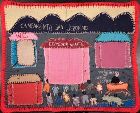 Mañana, día 22, inauguramos nueva exposición gracias a la colaboración de la Embajada de Chile en Irlanda y la Dirección de Asuntos Culturales del Ministerio de Relaciones Exteriores de Chile, los verdaderos motores de esta iniciativa.
Mañana, día 22, inauguramos nueva exposición gracias a la colaboración de la Embajada de Chile en Irlanda y la Dirección de Asuntos Culturales del Ministerio de Relaciones Exteriores de Chile, los verdaderos motores de esta iniciativa.
Arpilleras Poéticas comisariada por la académica y curadora chilena residente en Irlanda del Norte, Roberta Bacic, reúne alrededor de 30 arpilleras chilenas (técnica consistente en la utilización de piezas textiles gruesas y ásperas sobre cuya superficie se realizan trabajos de artesanía y bordado) de diversos tamaños que relatan la historia, la sociedad y la cultura del Chile reciente.
Roberta Bacic a lo largo de los años ha reunido una gran colección de dichas valiosas piezas, dedicándose desde comienzos del año 2000 a su recuperación, conservación y estudio. Ha expuesto a partir del 2008 en Nueva York, Hamburgo, Sao Paulo, Belfast, Barcelona, Berlín, Osaka, Kingston, Londres entre otras muchas ciudades y ahora en Dublín el público tendrá la oportunidad de disfrutar de este arte textil chileno que habla de las vicisitudes del hombre y la memoria.
Puedes visitar la exposición durante el siguiente horario:
Lunes a jueves: 2-7pm. Sábados: 10am a 2pm. Cerrados los viernes, domingos y Bank holidays.
From November 22th to December 15th, the Cervantes Institute, the Embassy of Chile in Ireland and the Cultural Affairs Committee of the Ministry of Foreign Affairs of Chile have the honour to invite you and your family to enjoy the Poetic Arpilleras exhibition of the Chilean academic and curator resident in Northern Ireland, Roberta Bacic. The exhibition will open at 6pm on November 22nd with the curator Roberta Bacic and a poetry recital by Chilean poet Jaime Huenún.
The exhibition “Poetic Arpilleras” gathers around 30 Chilean “arpilleras” (the technique consists scraps of materials hand sewn and appliqued onto burlap. Often arpillera dolls are used to add the three dimensional perspective. Wool is used to sew around the piece, either with a needle or crochet, to give it the shape of a picture to be hung on a wall) of various sizes. These tell about the history, society and culture of contemporary Chile.
Roberta Bacic has gathered throughout many years a vast collection of these valuable pieces devoting time to acquire, recover, conserve and study them since the early 2000’s. She has exhibited from 2008 in New York, Hamburg, Sao Paulo, Belfast, Barcelona, Berlin, Osaka, Kingston and London among many other cities. Now in Dublin, the general public will have the opportunity to enjoy this Chilean textile art which tells the story of human experience and memory.
The exhibition is open during these times:
Mon-Thurs.: 2-7 pm. Sat: 10 am-2 pm h.
Closed Frid., Sun. and Bank holidays
[Video] Catherine Dunne en el Festival Isla de Literatura / Isla Literary Festival
Catherine Dunne participó en la mesa redonda “Escritores sin escrúpulos: intimidad, violencia y humor en literatura” / Writers without scruples: Intimacy, violence and humour in literature. Entrevistada por Megan Specia. Edición de video: Cris Méndez.
Temas como la identidad y la memoria, la violencia o el humor fueron tratados por los invitados Ita Daly, Christopher Domínguez Michael, Rafael Gumucio y Catherine Dunne, con la moderación de Ciaran Cosgrove (Trinity College Dublin).
Catherine Dunne (Dublín, 1954), estudió inglés y español en Trinity College de Dublín. Su primera novela, In the Beginning, fue publicada en 1997. Le siguió A Name for Himself, finalista del premio Kerry Fiction Prize. Ha publicado otras seis novelas, The Walled Garden (2000), Another Kind of Life (2003), Something Like Love (2006), At a Time Like This (2007), Set in Stone (2009), Missing Julia (2011) y el ensayo An Unconsidered People: The Irish in Sixties London (2003).
Sus novelas The Walled Garden (El jardín vallado) y A Name for Himself (Un nombre propio) han sido traducidas al español.
Topics such as identity and memory, violence or humour were dealt with by guests Ita Daly, Christopher Domínguez Michael, Rafael Gumucio and Catherine Dunne, chaired by Ciaran Cosgrove (Trinity College Dublin).
Catherine Dunne (Dublin, 1954) studied English and Spanish at Trinity College, Dublin. Her first novel, In the Beginning, was published in 1997. A Name for Himself followed a year later, and was short listed for the Kerry Fiction Prize. She has published six further novels, The Walled Garden (2000), Another Kind of Life (2003), Something Like Love (2006), At a Time Like This (2007), Set in Stone (2009), Missing Julia (2011) and the non-fiction book An Unconsidered People: The Irish in Sixties London (2003).
Her novels The Walled Garden (El jardín vallado) and A Name for Himself (Un nombre propio) have been translated into Spanish.
Film screening | Cine: Las acacias
Todavía estás a tiempo de disfrutar del estupendo ciclo del cine argentino más actual. La película de hoy es Las acacias y se proyectará a las seis en el Café Literario.
se proyectará a las seis en el Café Literario.
La ruta que une Asunción de Paraguay con Buenos Aires. Un encargo: camionero debe llevar a una mujer desconocida. La mujer no llega sola, trae una niña en brazos. 1.500 kilómetros de viaje por delante.
La ópera prima de Pablo Giorgelli (…) presenta un conflicto menor que progresa a medida que los minutos transcurren, para terminar convirtiendo una historia mínima en una lección del más puro cine (en Escribiendo Cine).
Película ganadora de la Cámara de Oro en el último Festival de Cannes y premiada en San Sebastián, Londres, Biarritz y Bratislava, entre otros.
You can still enjoy the best of Argentinian cinema thanks to the film series that we show in October. The film that will be shown today is Las Acacias. The screening will be at 6pm at Cafe Literario.
Rubén is a lonely truck driver who has been covering for years the motorway from Asunción del Paraguay to Buenos Aires, carrying wood. However, today’s journey will be different. This morning, in a motorway stop near Asunción, Jacinta shows up an hour later to begin a journey by track which is going to take her to Buenos Aires. What’s more, Rubén finds out at that very moment that little Anahí, who’s 8 months old, will travel with them- It is not the best beginning. As kilometres go by, the relationship between Rubén and Jacinta will grow. They will slowly meet and sip into each other’s soul. None of them talks much about their lives. None asks much either. It’s a few word journey but it is not a silent one.
Awarded the Golden Camera at the Cannes Film Festival and other prizes in San Sebastián, London, Biarritz and Bratislava, just to mention a few.
Taller: El aceite de oliva: cultura, ciencia y gastronomía / Workshop: Olive oil: culture, science and cuisine
 ¿Sabías que en 2010 la UNESCO declaró la dieta mediterránea patrimonio inmaterial de la humanidad? ¿Y cuál es uno de sus ingredientes esenciales? El aceite de oliva.
¿Sabías que en 2010 la UNESCO declaró la dieta mediterránea patrimonio inmaterial de la humanidad? ¿Y cuál es uno de sus ingredientes esenciales? El aceite de oliva.
Si tienes tu reserva, ven hoy a las seis a disfrutar de este taller-cata organizado por el Instituto Cervantes para todo tipo de público. En él podrás aprender más sobre su producción, sus características, sus propiedades gastronómicas, sus beneficios para la salud o los últimos avances científicos con los que está relacionado, además de probar tres diferentes clases de aceite de oliva.
Desde la antigüedad, el aceite de oliva u “oro líquido”, como lo llamaba Homero, ha estado presente en la vida del ser humano y a lo largo de la historia no se ha empleado únicamente como condimento que enriquece los alimentos sino que también ha tenido usos medicinales, religiosos, cosméticos o industriales.
Las últimas investigaciones científicas relativas a la salud nos dicen que son los aceites con mayores niveles de grasas mono-insaturadas y que el consumo de dos cucharadas diarias reduce el riesgo de padecer enfermedades cardiovasculares. Además son ricos en antioxidantes y tiene otros muchos efectos beneficiosos sobre la salud.
SRC: reservas.dublin@cervantes.es
Este taller forma parte de Innovation Dublin 2012, que se celebra en Dublín del 15 al 26 de octubre. El festival demuestra la capacidad de Dublín de inspirar, interactuar e innovar.
Did you know that UNESCO declared Mediterranean diet as intangible cultural heritage in 2010? And what is one of its essential ingredients? Olive oil.
If you have a reservation, come today at 6pm and enjoy this tasting workshop organized by the Cervantes Institute for all types of people. Here you can learn more about its production, characteristics, culinary properties, health benefits or the latest scientific advances related to it, as well as taste the three different types of olive oil.
Since ancien times, olive oil or “the golden liquid”, as Homer called it, has been present in human lives and has not only served as seasoning to enrich food but has also had medicinal, religious, cosmetic and industrial uses.
The latest health related scientific research has shown that these oils have the highest levels of monounsaturated fats and that the consumption of two daily spoonfuls reduces the risk of cardiovascular diseases. In addition to that, they are rich in antioxidants and have many more beneficial effects on health.
RSVP: reservas.dublin@cervantes.es
This workshop is part of Innovation Dublin 2012, which takes place across Dublin from Oct 15th -26th. The festival demonstrates Dublin’s capacity to inspire, interact and innovate.
Concierto / Concert: Sheila Ríos
 La mejor música mexicana llega hoy al Café Literario a las 19:00h de la mano de la cantante Sheila Ríos con el espectáculo “Regresando a sus raíces”.
La mejor música mexicana llega hoy al Café Literario a las 19:00h de la mano de la cantante Sheila Ríos con el espectáculo “Regresando a sus raíces”.
Sheila Ríos (Guadalajara, Jalisco, México). De madre irlandesa y padre mexicano, Sheila Ríos cuenta con una trayectoria artística que lejos de ser larga, está llena de experiencia y reconocimiento. Su historia siempre ha estado envuelta en música, marcada por la herencia artística y nostálgica de Irlanda junto al romanticismo de las canciones mexicanas.
La música la ha llevado a muchas partes del mundo, con diferentes agrupaciones y como solista; destacando su participación con la banda mexicana de rock más reconocida y famosa a nivel internacional, “Maná”, con quienes ha compartido más que una profesión… una vida.
Ahora se encuentra trabajando en un nuevo material donde interpreta sus propias composiciones. El más reciente, “Trozos de Luna”, fue producido por Fher, el líder y catante de “Maná”, junto con Fernando Quintana, quien en esta ocasión la acompaña en esta visita a sus raíces, en la bella Irlanda.
Reservas: reservas.dublin@cervantes.es
Don´t miss today the best of Mexican music with the singer Sheila Ríos at 7pm at the Café Literario. She will be performing her show “Going back to the roots”.
Sheila Ríos (Guadalajara, Jalisco, Mexico). With an Irish mother and a Mexican father, Sheila Ríos has an artistic trajectory that is far from being long and still full of experience and recognition. Her story has always been connected with music, marked by the artistic and nostalgic heritage and the romanticism of Mexican songs.
Her music has taken her to many parts of the world, both as solo artist and with different groups, of which “Maná” especially stands out, the most recognized and famous Mexican rock band, with whom she has shared more than a profession…a life.
Now she is working with new material where she interprets her own compositions. The most recent one, “Trozos de Luna”, was produced by Fher, the leader and singer of “Maná”, along with Fernando Quintana, who in this occasion is accompanying her during the visit to her roots in beautiful Ireland.
Film screening | Cine: En enero quizás + Distancias
Esta tarde comienza el ciclo de cine Los límites de la frontera, organizado con PhotoIreland . Para la primera sesión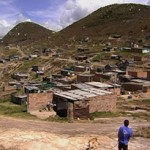 os hemos preparado un programa doble.
os hemos preparado un programa doble.
Primero se proyectará Distancias.
La historia: Un grupo de refugiados del Congo está bloqueado en Rabat. La frontera con España les impide cruzar a Europa. En una remota habitación en la periferia de la ciudad ensayan una pieza de teatro sobre su propia experiencia. Una obra imperfecta, inacabada. La vida real se confunde con su representación.
Entre ellos, Apollinaire cuenta, frontalmente, un eterno viaje de final incierto. Archivos televisivos muestran migrantes expulsados al desierto, obligados a empezar de nuevo. Rostros que han perdido sus nombres. Y detrás permanecen los espacios vacíos de lo sucedido. Huellas silenciosas que revelan su historia como nuestra.
Y seguidamente os ofrecemos En enero quizás.
La historia: Rumania ha entrado en la Unión Europea el 1 de enero de 2007. En la misma fecha se estableció una moratoria de dos años a la libre circulación de trabajadores procedentes de Rumania. En consecuencia de esta medida, hasta el 1 de enero de 2009, muchos rumanos que se encuentran en España no pueden trabajar por cuenta ajena pero tienen el derecho de residencia… Daniel es un rumano que intenta sobrevivir en las calles de Barcelona y aunque sin abrigo mantiene la esperanza que en enero de 2009 conseguirá encontrar un trabajo y reorganizar su vida.
Os esperamos hoy a las 18:00 en el Café Literario.
This evening the new cinema series The limits of the frontiers starts. It is organized in cooperation with PhotoIreland. A group of refugees from Congo are stuck in Rabat. The Spanish borderline prevents them from entering Europe. In a remote room on the outskirts of the city they rehearse a theatre piece based on their own experiences. An imperfect, unfinished piece. Boundaries between real life and the stage are blurred.
First we will show Distancias.
The story: Apollinaire recounts, face to face, the never-ending journey with an uncertain conclusion. Television archive images show us emigrants forced into the desert to start their journey once more. Faces without a name. Left behind are the empty spaces of what has already happened. Silent tracks that reveal their story as our own.
The second screening is En enero quizás.
The story: When Romania joined the European Union on the 1st of January 2007, the Spanish government established a two-year moratorium to restrict freedom of movement for Romanian workers. Following this measure, many Romanians with residency status in Spain were prevented from working in Spain until the 1st of January 2009. Daniel is a homeless Romanian that struggles to survive in the streets of Barcelona and believes that he will find a job in January 2009 and change his life.
We hope to see you today at 6pm at Café Literario.
¡Fiesta Latina en el Instituto Cervantes de Dublin!
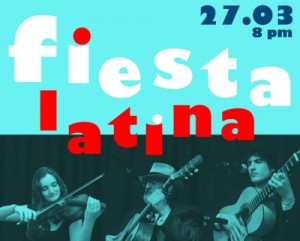 Mesas y sillas fuera, parqué encerado, luces de fiesta, vino en lugar de café… Atención salseros: ¡Esta noche nuestro Café Literario se viste de baile!
Mesas y sillas fuera, parqué encerado, luces de fiesta, vino en lugar de café… Atención salseros: ¡Esta noche nuestro Café Literario se viste de baile!
La Mucura, Los Panchos, Mariano Mores o Carlos Gardel son algunos de los clásicos latinos que sonarán esta noche de la mano de Kazemi, Sandoval & Cia, un trío especializado en levantar al público de sus asientos con su elegante y nostálgico repertorio de tangos, boleros, rumbas, salsa y cha cha cha de los años 20, 30 y 40.
Sus armas son la pasión de la guitarra española, la belleza del violín, la elegancia de sus voces y el buen humor latino, con las que ya han conquistado al público en salas como el Hampton Hotel de Donnybrook, el Project Arts Centre en Temple Bar, el Mansion House, Café en Seine, el Radisson Saint Helen’s Hotel o el Festival Internacional de Tango de Dublín, por citar solo unos cuantos.
Escucha algunas de sus canciones aquí para poner tu corazón y tus músculos a tono y reserva tu entrada, que aún estás a tiempo: reservas.dublin@cervantes.es. Pues eso, fiesta y buen humor ¡que ya es primavera en Dublín!
Tables and chairs out, polished flooring, party lights, wine instead of coffee… Attention salseros: This evening our Café Literario gets dressed up in ballroom!
La Mucura, Los Panchos, Mariano Mores and Carlos Gardel are some of the Latin classics to be played this evening by Kazemi, Sandoval & Cia, a trio specialized in getting the audience out of their seats with their elegant and nostalgic repertoire of tangos, boleros, rumbas, salsa and cha cha cha from the 20s, 30s and 40s.
Their weapons are the passionate Spanish guitar, the beautiful sound of violin, their elegant voices and Latin good mood. With these they have already conquered the audience in Hampton Hotel in Donnybrook, the Project Arts Centre in Temple Bar, Mansion House, Café en Seine, Radisson Saint Helen’s Hotel and International Tango Festival in Dublin, to mention but a few.
Listen here to some of the songs to get your muscles and heart in the mood and make your reservation, you’re still on time: reservas.dublin@cervantes.es. That’s it, party and good mood, because spring has already arrived to Dublin!
Coro Cervantes de Dublín / Call for the Choir Cervantes
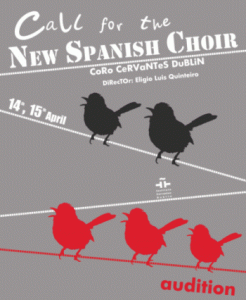 ¿ Te gusta cantar? Si siempre has deseado pertenecer a un coro, ahora tienes la oportunidad de unirte al “Coro Cervantes Dublin” el único en Irlanda expresamente especializado en el repertorio coral español, latinoamericano y en el repertorio en español de compositores de otra procedencia.
¿ Te gusta cantar? Si siempre has deseado pertenecer a un coro, ahora tienes la oportunidad de unirte al “Coro Cervantes Dublin” el único en Irlanda expresamente especializado en el repertorio coral español, latinoamericano y en el repertorio en español de compositores de otra procedencia.
El coro se familiarizará con la técnica vocal y el estilo particular ligados a la música polifónica, además de aprender la pronunciación del latín histórico hispánico (obras antiguas en latín) y de la lengua castellana.
Como director del coro contamos con Eligio Luis Quinterio. Actualmente es director artístico de los grupos Capilla Cayrasco y Camerata Cayrasco, ofrece recitales como solista y como acompañante de canción barroca y lied romántico, y es miembro de numerosos grupos como especialista en bajo continuo.
Del catorce al quince de abril tendrán lugar las audiciones en el Café Literario, os animamos a que participéis en esta interesante e enriquecedora experiencia.
Do you like singing? If you have always wished to belong to a choir, you have the chance now to join the “Choir Cervantes”, the unique choir inIreland specialized in Spanish and Latin American choral repertoire and the repertoire of other Spanish composers.
The choir will get familiar with vocal technique and the style particularly associated with polyphonic music apart from learning the pronunciation of Hispanic and historical Latin (old musical compositions in Latin) and the Spanish language.
The members of the choir would learn subtleties of the Spanish language and delve into the rich and extensive musical literature and Spanish culture.
Eligio Luis Quinteiro will be the choir director. He is the artistic director of the groups Capilla Cayrasco and Camerata Cayrasco and gives solo recitals and accompanies songs with the tiorba and guitar. He is also a member of numerous groups as a specialist in bass.
Auditions will take place the 14th and 15th April at the Cafe Literario. We encourage you to take part in this interesting and enriching experience.
Celda 211: un peliculón / a not to be missed!
Además de arrasar en los Premios Goya con 8 estatuillas, Celda 211 ha tenido una excelente acogida por parte del público, dos hechos que la convierten, como decimos coloquialmente en español, en todo un peliculón. Por supuesto, no podía quedar fuera del ciclo de Premios Goya que el Instituto Cervantes de Dublín ofrece al público irlandés durante el mes de febrero.
Celda 211 es un filme de género carcelario en el que presos, funcionarios y políticos confluyen en una trama intensa y hostil, altamente recomendada en casos de carencia de adrenalina. Hoy a las 18h en el Café Literario, te invitamos a pasar un buen rato entre rejas.
Apart from winning by a landslide in the 2010 edition of the Goya Awards with 8 statuettes, Cell 211 is also a box office success. These two features make this film what is colloquially called in Spanish a peliculón, that is, a not to be missed. Of course it was a must to include it in the Goya Awards Film Series that Instituto Cervantes Dublin offers to the Irish audience throughout February.
Cell 211 is a prison genre film in which prisoners, guards and politicians get involved in an intense and hostile plot, highly recommended for people with adrenaline deficiency. If you want to have a good time behind bars, come today at 6pm to Café Literario.




